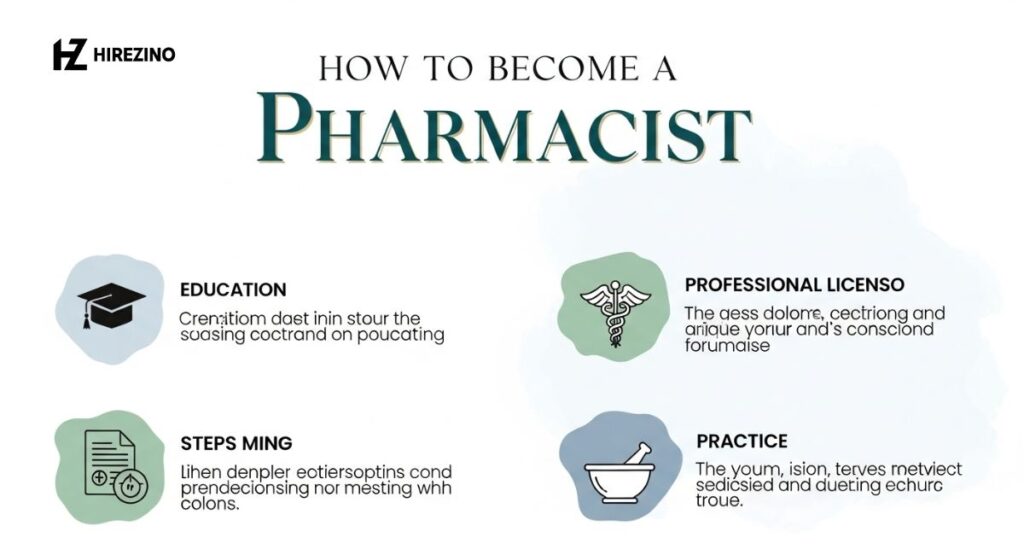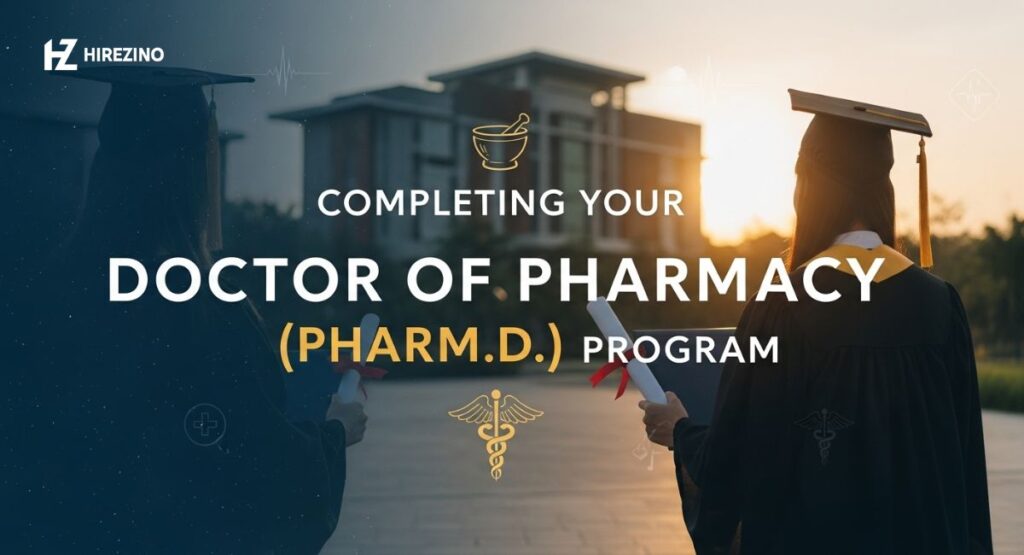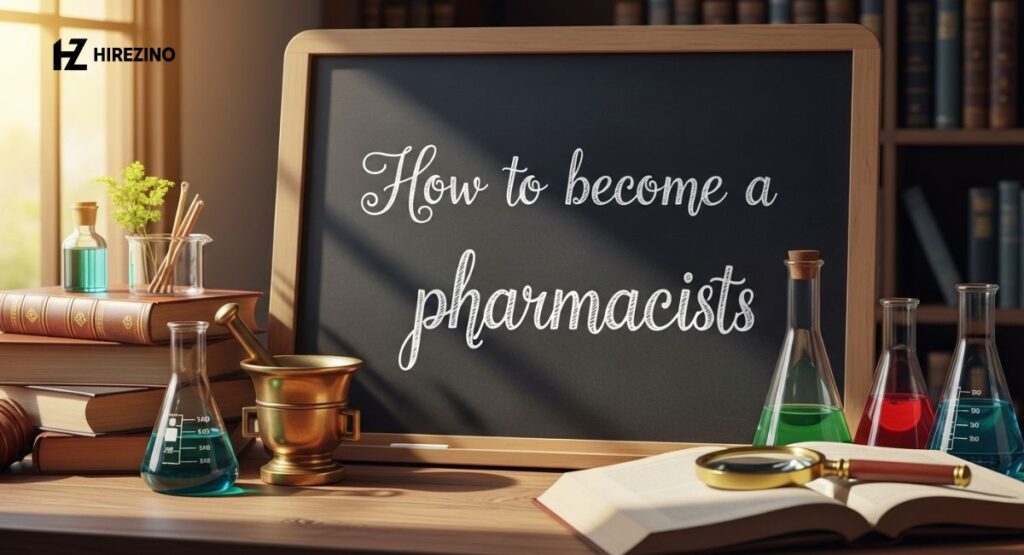how to become a pharmacist is one of the questions that come to the minds of many students whenever they aspire to create a fulfilling career in the medical field. The path needs commitment, good educational background, and enthusiasm to assist fellow patients by attending to them and managing medication. The pharmacy education timeline in the United States is straightforward and therefore involves pre-pharmacy education followed by completing a Doctor of Pharmacy (PharmD) program.
In the process, the students will need to be ready to compete in pharmacy admissions / application process, to perform well in a rigorous pharmacy school curriculum, and to acquire practical experience in pharmacy internships / experiential training. Upon graduation, a major bit to passing the North American Pharmacist Licensure Examination (NAPLEX) and state-specific requirements is the key to licensure. Knowing all of these phases does not just provide the answer to the question of what it takes to become a pharmacist, but it also equips you with a number of opportunities in hospital and community pharmacy work or further specialties such as clinical pharmacy.
Exploring the Pharmacy Profession
Pharmacy is not just dispensing drugs. Pharmacists give care and administration of medication, proper dosage, and advice to enhance health conditions. Pharmacists have an important role in healthcare in hospitals, community pharmacies or clinical environments. Knowing how to become a pharmacist makes you be in a profession where your talent work directly impact the health of patients.
The career paths of the pharmacist are diverse. You may become a specialist in such fields as clinical pharmacy, nuclear pharmacy, or medical cannabis, or get employment in retail and hospital positions. All the directions demand a commitment and adherence to a regulated pharmacy education schedule. This is a good and stable career because of the demand of healthcare professionals. The requirements of pharmacy programs are considered as a key to success.
Educational Requirements to Become a Pharmacist

In order to begin the how to become a pharmacist process, students have to undergo pre-pharmacy courses. The common ones are the courses of biology, chemistry, physics, and math. The most important aspect in getting into a pharmacy school is having a good GPA. The course work provides a student with a good basis in pharmacy degree programs and pharmacy school curriculum.
Majority of students at that point apply to a Doctor of Pharmacy (PharmD) program. This lasts four years and is accredited by the standards of ACPE accreditation. The Pharm.D. provides graduates with training in pharmacy and counseling patients. Within this period, students are participating in pharmacy internships / experiential training to get a real life experience on the healthcare setting.
Pharmacy School Admissions Process
The pharmacy admissions / application process requires an individual to apply to PharmD programs. Students are required to provide transcripts, letters of recommendation and standardized test results such as the Pharmacy College Admission Test (PCAT). To be able to obtain a place in a competitive program, it is important to excel in interviews and prepare the interviews in pharmacy school and PCAT.
The admissions process also takes into account the desire to grow in pharmacy and the possible salary. The successful applicants demonstrate the good performance in the pre-pharmacy coursework and work experience in the healthcare settings. The process of learning to how to become a pharmacist includes the ability to master these steps and to prepare to the challenges of the pharmacy school.
Completing Your Doctor of Pharmacy (Pharm.D.) Program

After admission, students pursue a planned academic curriculum of pharmacy school. The Pharm.D. program entails classroom teaching in the fields of pharmacology, medicinal chemistry and therapeutics as well. In addition to this, students undergo pharmacy practice experiences (IPPE, APPE) which give them practical clinical training.
Such experiences equip students with pharmacy practice and counseling of patients in the real world. The students do their rotation in hospitals, community pharmacies and specialty areas. The Pharm.D. program is an essential event on the way of how to become a pharmacist, which prepares a graduate to be licensed and practice professionally.
Licensure and Certification Requirements in California
Once they have a Pharm.D., the future pharmacists are expected to fulfill state requirements of pharmacy licensure. This requires the pass of the North American Pharmacist licensure examination (NAPLEX) and the Multistate Pharmacy Jurisprudence Exam (MPJE) in California. These exams are used to test pharmacological, ethical and state laws knowledge.
Pharmacists should also undergo background checks and provide evidence of pharmacy practice experiences (IPPE, APPE). Pharmacy licensure will enable you to apply in the hospital and community pharmacy practice. Knowing how to become a pharmacist in the U.S. is a sure way of remaining within the bounds of the law and profession.
Gaining Experience and Starting Your Career
Experience is essential after licensure. The first jobs are entry-level positions such as working in the retail pharmacy and hospitals or clinics. These lower level pharmacy positions will brush up your skills in pharmacy practice and counseling patients. Finishing pharmacy internships / experiential training improves your resume and gains confidence.
Mentorship and networking contribute to career promotion. Lots of pharmacists investigate pharmacy specialization or high-level clinical jobs. The awareness of how to become a pharmacist entails finding roles in the healthcare facility where you can work as a pharmacist or do what you enjoy and are good at.
Specializations and Career Advancement Opportunities

Nuclear pharmacy, medical cannabis or clinical pharmacy is one of the pharmacist specializations. Specialization may also include further certification or residency. These positions provide better involvement into the pharmacy activity and patient counsel and better compensation.
Leadership in the hospital or corporate pharmacy, as well as in their career progression, is also included in terms of career progression. During the Pharm.D. program, specialties selection may be oriented during pharmacy elective rotations. To know how to become a pharmacist in the U.S., he or she has to analyze what he loves, and what the business needs.
Continuing Education and Professional Development
In order to continue to be licensed, pharmacists have to take continuing pharmacy education. These programs enlighten the professionals on new drugs, treatment and healthcare regulations. Lifelong learning benefits the career of the pharmacy profession in terms of development and payment.
It is possible to expand knowledge and networking, joining professional organizations, and attending seminars. Keeping abreast is a guarantee of quality in terms of patient care and medication administration. There is also the process of learning on how to become a pharmacist which entails taking a life long development during your career.
Salary, Job Outlook, and Employment Statistics
The income of pharmacists in USA depends on the state and specialization. The median salary is approximately 128,000 per year, and more in clinical or special positions. The future prognosis of the pharmacist career is stable in terms of growth because of the rising healthcare needs.
The Employment statistics show that there are opportunities in the hospital and community pharmacy jobs and clinical settings. According to the Bureau of Labor Statistics, it is estimated that it will increase by 3 percent in the coming 10 years. Knowledge on how to become a pharmacist will make you adequately prepared to such opportunities.
| Setting | Median Salary | Growth Rate |
| Retail Pharmacy | $122,000 | 2% |
| Hospital Pharmacy | $135,000 | 4% |
| Clinical Pharmacy | $140,000 | 3% |
Similar Occupations and Career Alternatives
Pharmacy has related jobs such as the pharmacy technician, clinical researcher or healthcare consultant. These possibilities provide the opportunity to have the pharmacy practice, as well as patient counseling, without the entire Pharm.D. program.
The information about being a pharmacist in the U.S would help you strike the balance between these choices. Other professionals join the teaching profession, pharmaceutical scientists or regulators. Studying pharmacy career opportunities is an assuring method of making an informed decision concerning the professional career.
Additional Resources and Support
Professional organizations are vital in advising upcoming pharmacists and assisting the existing professionals. An example that would be the American Pharmacists Association (APhA), which provides an abundance of resources, such as networking and conferences, scholarships, and guidance on career. Becoming a member of these organizations will not only make you abreast of the current happenings in the pharmacy field and patient education, but also introduces you to senior mentors who will offer professional guidance on your career development and remuneration as a pharmacist.
State pharmacy boards are a good resource to find out more information on pharmacy licensure requirements by state so that you can be sure to provide all legal requirements of practicing pharmacist. Moreover, numerous boards and professional organizations are providing online courses and courses in continuing pharmacy education to assist in maintaining your license and broadening your knowledge in fields such as clinical pharmacy, pharmacy specialization and medication management. The advice and tips in mentorship programs, alumni networks, and online communities can be helpful in entry-level pharmacy positions, jobs in hospitals and community pharmacies, and advanced practice. The effective use of the mentioned resources will help you on your way how to become a pharmacist, improve your career growth, and guarantee your success in the various pharmacy professions in the long-term perspective.
Conclusion
The process of becoming a pharmacist is not an easy one, but it is very rewarding. Your choice to learn how to become a pharmacist in U.S., complete the necessary pre-pharmacy coursework, and succeed in a Doctor of Pharmacy (PharmD) program, and passing pharmacy licensure licensing by state, gets you on the path to a satisfying pharmacy career. Every phase such as pharmacy school admissions to pharmacy practice experiences (IPPE, APPE) provides knowledge and skills to provide the best care to patients and medication management.
Due to the pharmacy specialization, clinical practice or a leadership role in healthcare facilities, pharmacists may improve their careers in various ways. By acquiring education and professional development, you will be assured of having the latest knowledge, and this will provide you with a chance of earning more and having numerous career opportunities in pharmacy. For, once you get devoted to learning and experience in the sphere, you will be able to make a difference in the life of patients and help yourself in gaining personal and professional enrichment.
FaQs
How quickly can you become a pharmacist?
It usually takes 6–8 years, including undergraduate studies and a Doctor of Pharmacy (PharmD) program.
Is becoming a pharmacist hard?
Yes, it’s challenging because of rigorous coursework, clinical training, and licensure exams.
How long does it take to become a pharmacist in GA?
In Georgia, it typically takes about 8 years, including pre-pharmacy and a PharmD program.
How to become a pharmacist in CA?
In California, you must complete a PharmD program, pass the NAPLEX and CPJE exams, and meet state licensure requirements for how to become a pharmacist.
Do pharmacists make good money?
Yes, the average salary for pharmacists in the U.S. is around $128,000 per year.
Is pharmacist harder than nursing?
Both are demanding, but pharmacy requires more years of schooling while nursing involves more direct patient care.

